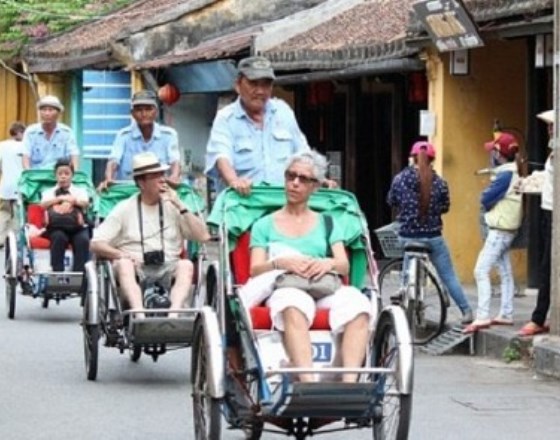
The stable dollar/dong exchange rate is having a negative impact on Vietnam’s agriculture and export sectors, especially the tourist industry, local economists warned Thursday.
With the Vietnamese dong remaining stable against the strong U.S. dollar, tourism packages to Vietnam have become more expensive, Dr. Nguyen Duc Thanh said at a ceremony to introduce the annual 2015 Vietnam Economic Report in Hanoi.
Dr. Thanh is the head of the Vietnam Institute for Economic and Policy Research (VEPR), the composer of the report slated for release in July.
While many currencies are now weaker against the dollar, the Vietnamese dong has been kept within a two percent band against the greenback so far this year, as committed by the State Bank of Vietnam, the country’s central bank.
The SBV devalued the dong by one percent for the second time this year on May 7, sending the forex rate to VND21,673 a dollar. An SBV deputy governor said on Wednesday the two-percent band movement will be kept for the rest of the year.
“The dollar/dong exchange rate has been kept stable since 2007, which has strongly affected the tourist industry,” Dr. Thanh said.
He thus suggested that an appropriate adjustment be considered and applied to the exchange rate management policy.
His view was shared by many other economic experts at the event, who said the Vietnamese dong is now much stronger than the currencies of the country’s most important sources of tourists, such as Russia.
Vietnam’s tourism has thus become more expensive and less attractive to holidaymakers from some countries, they said.
An expert pointed out that with the current exchange rate, with one dollar a tourist can only buy 2kg of rice.
But if the dong were depreciated to VND30,000 a dollar, that tourist would be able to buy 3kg of rice with the same $1.
The weak ruble is indeed the main reason that has discouraged Russians from traveling to Vietnam since late 2014, according to industry insiders.
While a Russian couple had to pay $800, or 28,000 rubles, for a 12-night stay at a four-star hotel in Vietnam in 2013, they had to pay 49,000 rubles in late December 2014 as the currency had weakened, Nguyen Duc Tan, managing director of Anex Tour Vietnam, told newswire VnExpress in January this year.
Dr. Huynh The Du, academic director of the Fulbright Economics Teaching Program, also said the strong dong is greatly affecting Vietnam’s competitiveness on the export market.
“Few countries want to have a strong currency,” he said at the Hanoi event, taking Japan as an example.
“In 1949 Japan set the dollar/yen exchange rate at 360 yen per dollar, instead of 200 yen as earlier planned,” he elaborated. “This was a crucial factor that improved Japan’s competitiveness.”
Dr. Du said it is wrong to think that devaluing the dong will create pressure on the state budget in repaying public debts.
“When the dong is weakened, the country’s exports will soar, meaning bigger revenue for the state coffers, and stronger debt repayment ability,” he explained.
Dr. Du concluded that “a strong currency results in great damage,” adding the current exchange rate benefits speculators more than economic competitiveness.
Vietnam’s latest depreciation of the dong was intended to spur exports and curb imports.
The country is expected to post a $3 billion trade deficit in the first five months of this year, whereas it enjoyed a $1.52 billion surplus in the same period last year.
The Vietnam Economic Report has been published annually since 2009, providing a summary of the major economic issues of the year and giving outlooks and recommendations for the ensuing year.
The 400-page 2015 report will be released in July in Vietnamese, and the English version will follow in September.
original source: http://tuoitrenews.vn/business/28379/strong-currency-reduces-vietnams-tourism-competitiveness-experts
